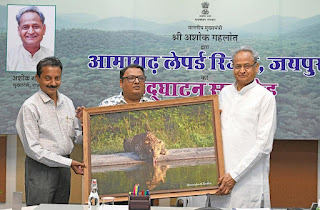Jaipur,May 23. In a major initiative in eco tourism, Rajasthan this weekend added one more leopard safari in its capital city, Jaipur. Chief Minister Mr Ashok Gehlot, who virtually inaugurated the Amagarh Leopard Reserve, termed it the result of sustained effort in conservation. Gehlot remembered the conservation history of Rajasthan mentioning the Project Tiger. Launched in 1973 with the initiative of the then Prime Minister Indira Gandhi, Project Tiger helped the country to achieve stability in tiger population. The Project had Rajasthan's own eminent conservationist Kailash Sankhla as it's first director, Gehlot noted.
Amagarh, in the outskirts of Jaipur, is the second leopard sanctuary in the surroundings of the Jaipur city. A rare thing in the annals of conservation--perhaps in the world as well-- for a city to have two leopard sanctuaries. A senior official of the Rajasthan Forest Department informed that the leopard density in Jaipur (surroundings)is highest in the world!
According to DN Pandey, Head of the Forest Force, Rajasthan, a unique aspect about Amagarh and Jhalana-- the other leopard reserve in Jaipur --was that leopards were not introduced there from outside. The local population was allowed to regenerate and flourish, he noted.
Perhaps that warranted a note of caution which came from the otherwise jubilant Mr.Gehlot on the occasion that with two leopard sanctuaries and a national park(Nahargarh NP) in the vicinity, the authorities here should be alert about any possible man-animal conflict in the future.
Amagarh Leopard Reserve, which is spread over 16.36 sq kms on the eastern side of Jaipur, is separated from the Jhalana Leopard Reserve by the national highway connecting Jaipur and Agra. Again, the Jaipur-Delhi highway separates the Amagarh Reserve and the Nahargarh Park.
That way, Amagarh, nestled on the Aravallis, becomes a corridor between Jamwa Ramgarh sanctuary (also in Jaipur district) and Sariska Tiger Reserve in Alwar district. The Rajasthan Chief Minister deserves kudos for this pathbreaking initiative on the International Day for Biological Diversity (May 22) as the two reserves, put together with already existing green corridor of Jamwa Ramgarh, can provide animals access upto Sariska Tiger Reserve.
Amagarh is estimated to house 15-20 leopards at present. Their tribe is, surely, flourishing.Amagarh, apart from a variety of avifauna and flora, has a few forts and temples dotting it's rugged terrain.
The authorities have decided on safaris to the park in two shifts, in the morning and evening. Safari tickets are available online: website: https://sso. rajasthan.gov.in







